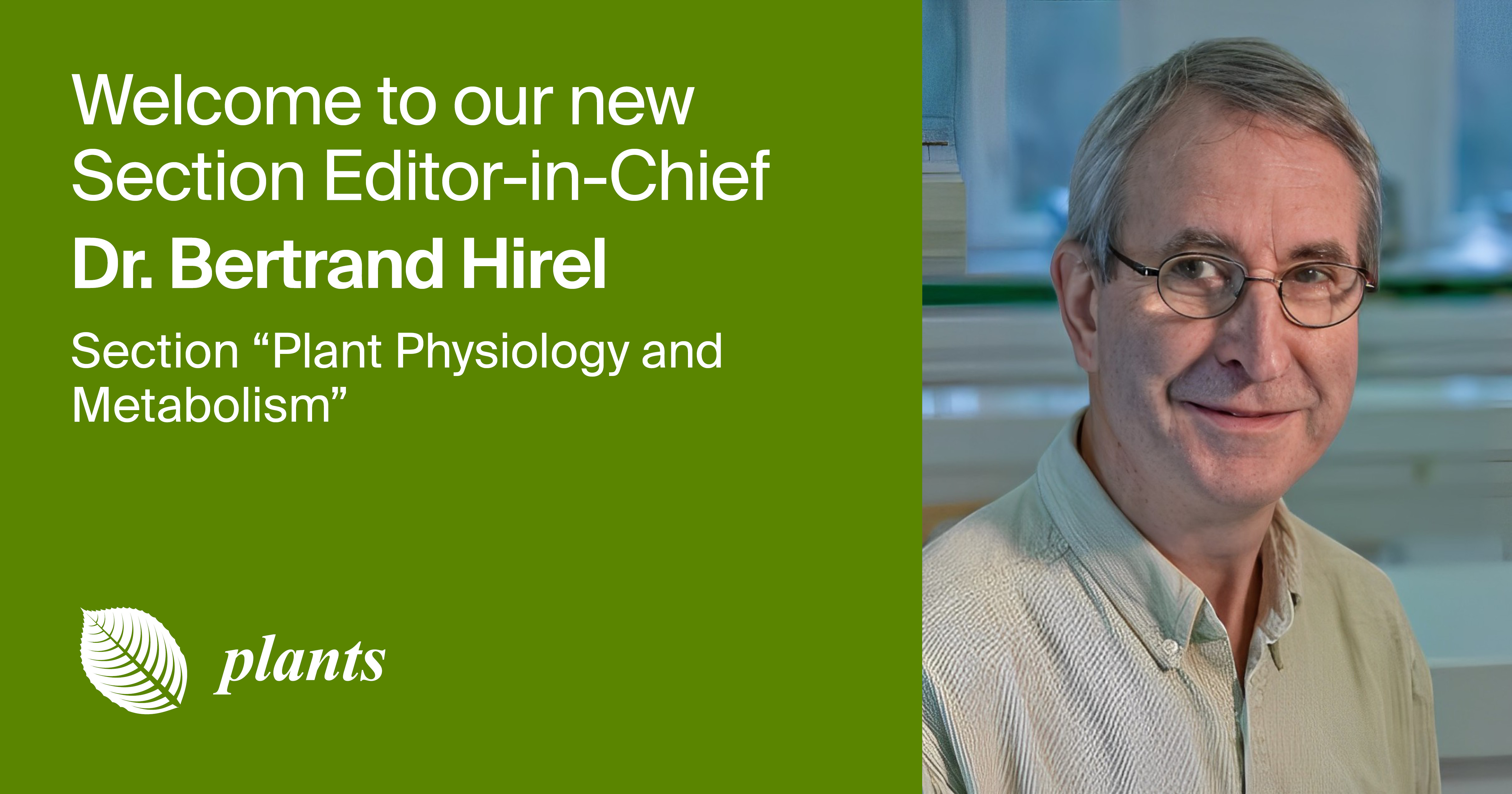
Dr. Bertrand Hirel Appointed Section Editor-in-Chief of Section “Plant Physiology and Metabolism” in Plants
We are pleased to announce that Dr. Bertrand Hirel has been appointed Section Editor-in-Chief of the Section “Plant Physiology and Metabolism” in Plants (ISSN: 2223-7747).
Dr. Bertrand Hirel is the Project Manager in the Symbiotic Nitrogen Acquisition in Plant-Microbe Systems team (formerly Nitrogen Management and Plant Productivity) at INRAE (Institut national de recherche pour l'Agriculture, l'Alimentation et l'Environnement, France). He is a senior scientific officer at CNRS (Centre National de la Recherche Scientific, France). Dr. Hirel received his Ph.D. from the University of Nancy, France, and his D.Sc. from the University of Paris, France. Over the last 40 years, he has participated as a keynote or invited speaker at more than 50 international conferences. He has published 148 peer-reviewed papers and 34 book chapters. Dr. Bertrand Hirel has trained several undergraduate and graduate students and postdoctoral scientists at INRAE, as well as teaching in several French universities. The overall objective of his research is to better understand and improve nitrogen use efficiency (NUE) in higher plants, with emphasis on crops in general and on cereals in particular. These studies have allowed the advancement of knowledge on the regulation of N assimilation in model and crop species using combined agronomic, molecular physiology, molecular genetics, modeling, and system biology approaches. More recently, his research projects were extended to studying the beneficial interactions between plants and microorganisms for N acquisition. The knowledge gained on crop NUE and its regulation has been focused towards the development of innovative plant breeding strategies and future agricultural applications, considering the current constraints related to the protection of the environment and the development of sustainable agriculture practices.
The following is a short interview with Dr. Bertrand Hirel:
1. What appealed to you about the journal that made you want to take the role of Section Editor-in-Chief?
From the beginning of their creation, I have been invited to be a reviewer or member of the Editorial Boards of MDPI journals specialized in plant biology and agronomy. Throughout my scientific career, I have also participated on a regular basis in the evaluation of numerous articles in most international scientific journals and grant proposals dealing with these two topics. Therefore, I thought that it was the right time to give the benefit of my scientific expertise in the field, in order to promote the impact of the journal at the international level and to maintain a high standard for article evaluations.
2. Which research topics do you think will be of particular interest to the research community in the coming years?
In recent years, high-throughput techniques, also called omics-based techniques, have been increasingly used to better understand plant physiology and metabolism, from gene expression to the production of metabolites. The use of these techniques has allowed the generation of massive amounts of data, which need to be integrated both in a holistic and comprehensive manner. The integration of such data, either at the organ or at the whole plant level, is therefore a major challenge to provide a better understanding of plant physiology as a function of environmental constraints. One can expect in the near future that the acquired knowledge will be used in agriculture and for guiding plant breeding. The construction of metabolic models and the use of machine learning are now considered to be promising approaches that can help predict the development and productivity of a model or cultivated species in the context of both climate change and sustainable agricultural productivity. The study of the impact of soil microflora, whether symbiotic or not, also constitutes a growing area of research, with the aim of limiting biotic or abiotic stresses in a wide range of environments.
3. As an editor, what do you look for most to determine if a paper will be published in the journal?
The main evaluation criteria are, of course, both the quality and presentation of the science, while considering what has already been published in the field. Moreover, the innovative aspect of the work, in terms of topicality, needs to be considered in an objective and critical manner.
My goal as Editor-in-Chief for the Section “Plant Physiology and Metabolism” will be to promote the science in the field, not only for plant physiologists, but also to make it accessible to other colleagues more specialized in agronomy and plant breeding. I think that a particular effort will have to be made to maintain the quality of fundamental research on model plants, but also to provide avenues concerning possible applications by studying the physiology of crops grown under agronomic conditions. It has been demonstrated that studying the physiology and metabolism of plants grown in the field, although more labor-intensive, is feasible and provides key information on their functioning under various environmental constraints. The transfer of knowledge from model to crop species is also a key issue in the development of practical applications.
We warmly welcome Dr. Bertrand Hirel as Section Editor-in-Chief of “Plant Physiology and Metabolism”, and we look forward to achieving many milestones under his leadership.
